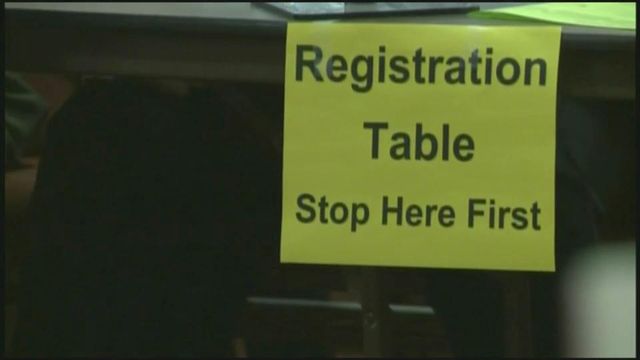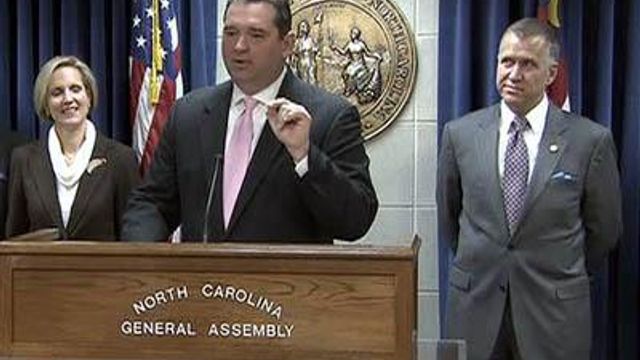House Republicans file voter ID bill
House Republican leaders have filed a voter identification proposal they say takes into account concerns about disenfranchisement of low-income, young and elderly voters.
Posted — Updated"This bill has had more discussion than anything in recent history," said House Elections Committee Co-chairman Tim Moore.
Under the proposal, beginning in 2016, voters would be required to show a photo ID at the polls. The bill would allow "multiple forms of state-issued ID," according to Rep. Tom Murry, R-Wake, including tribal cards, public university IDs and state employee IDs. Private university IDs would not qualify.
Voters without a photo ID will be allowed to cast a provisional ballot but would have to return to their local board of elections with a valid photo ID to have the ballot counted.
Approved forms of IDs that have expired would be accepted up to 10 years from their date of issuance or date of expiration, whichever is later.
For voters over 70, a photo ID that was valid at the time they were 70 will be considered valid indefinitely.
The bill would allow free voter IDs as well as free copies of birth certificates for those who are willing to attest under the penalty of perjury, a felony, that they have a "financial hardship." The definition of "financial hardship" is not provided in the proposal.
Those who can pay for their photo ID would be required to do so.
People with disabilities as defined in federal law would not be required to show ID.
The bill also makes changes to absentee voting by mail. The forms would be pre-printed, which Tillis says will make the process easier. But beginning in 2014, they will require the submission of a driver's license number, the final four digits of a Social Security number or other federally-approved identification documents like a copy of a utility bill.
Bob Hall, director of voting rights group Democracy North Carolina, questioned why the same rules for absentee voting don't apply to people who show up at the polls without identification.
"Don’t make a registered voter come back a second time after standing in line for 45 minutes," Hall said, calling the ID proposal "a giant waste of money" that creates more problems than it solves.
Tillis says the legislation will "restore some measure of confidence" in elections in North Carolina.
"Three out of four people say this is something they would like to have," he said. "That's one of the key reasons we're doing it."
Regardless of popular support, House Minority Leader Larry Hall said he believes voter ID creates barriers to a constitutional right.
"This is a pay-to-vote type of situation," said Hall, D-Durham.
The bill calls for creating a new agency, the Voter Information Verification Agency, consisting of 14 employees who will work with counties to provide assistance to voters who need IDs and to promote registration.
The proposal also directs the State Board of Elections to study the feasibility of creating a statewide digital database of photos, perhaps using facial recognition software, according to Rep. Harry Warren, R-Rowan.
Moore, R-Cleveland, says the bill will be debated at a public hearing scheduled for next Wednesday. The House Elections Committee will likely vote on the measure April 17, and it would go to the floor sometime around April 22.
House Elections Committee Co-chairman David Lewis said the legislation is very different from the photo ID bill filed last session.
"We've listened this entire way through," said Lewis, R-Harnett. "What we've heard is, 'If you're concerned about election integrity, don't leave absentee out.' We didn't.
"We've heard, 'Don't leave folks behind that don't have an ID.' We're going to have a proactive outreach to reach these folks and help them get the ID in their hand," he said.
Lewis said lawmakers don't yet have a projected cost for the legislation.
Tillis said he expects push-back from both ends of the political spectrum on the issue, but he said he thinks the measure will ultimately benefit those voters critics have said it would hurt – those who don't have photo ID.
"It is in every citizens' best interest to have some form of photo ID. There are a variety of benefits, and I think they're enabling to the population," he said. "We want to help them do that, and I think that's a very important benefit to this bill that has nothing to do with voter ID."
Related Topics
Copyright 2024 by Capitol Broadcasting Company. All rights reserved. This material may not be published, broadcast, rewritten or redistributed.






